WHAT WE'RE WATCHING
‘Everything Everywhere All At Once’ is a dazzling, must-watch sci-fi spectacle
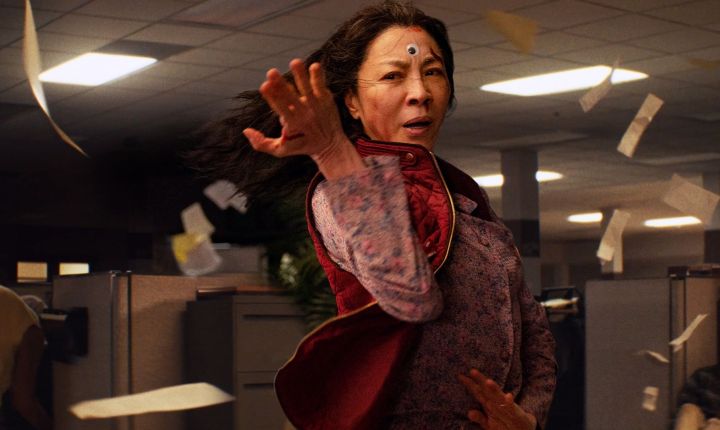
The directing duo of ‘Swiss Army Man’ have teamed up with A24 to produce one of the most exciting films of 2022 – a stunning sci-fi show spanning several genres and infinite universes which took home the 'Best Picture' award at the Oscars.
Everything Everywhere All At Once (Everything for short) harnesses the existential absurdist comedy of Douglas Adams’s Hitchhiker’s Guide to the Galaxy, the epic scale and modern kung fu choreography of The Matrix, and the complex investigation of culture and interpersonal relationships we have come to expect from subtler A24 films like Minari or Lady Bird; and yet its comparison to these beloved films barely scratches the surface of its multifarious genius.
In a film’s genetic make-up, some genres are more dominant than others. Everything seems, at a superficial glance, a superhero movie with several unusual elements thrown in, but as soon as you start watching it, you come to understand that it’s actually the other way around – a philosophical domestic dramedy with superhero elements.
We begin with the chaos of the ordinary lives of the Wang family. Evelyn is a Chinese-American woman with way too much going on in her life. Brace yourself: her disapproving father, Gong-Gong, is visiting and she’s desperate to make a good impression of her household and her business – a laundromat she runs with her husband, Waymond, who unbeknown to her wants to file for divorce but he never get’s a chance to tell her because they’re too busy organising a party for the Lunar New Year – which they may not get to do at all because they’ve been called in to the IRS office – which Evelyn does not want Gong-Gong to know about, but someone needs to look after him and her daughter Joy can’t do it because she has to go with to the IRS office to translate, so Joy suggests that her girlfriend can look after Gong-Gong – but Evelyn doesn’t want her father to know that Joy is lesbian – and so on and so on.
By now you’ve surely made sense of one dimension of the film’s title.
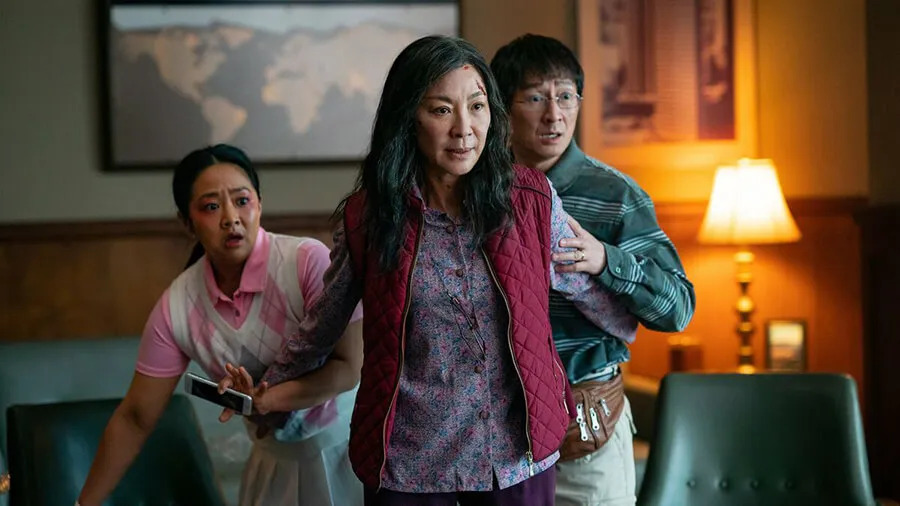
Stephanie Hsu as Joy, Michelle Yeoh as Evelyn Wang, and Ke Huy Quan as Waymond (image courtesy of A24)
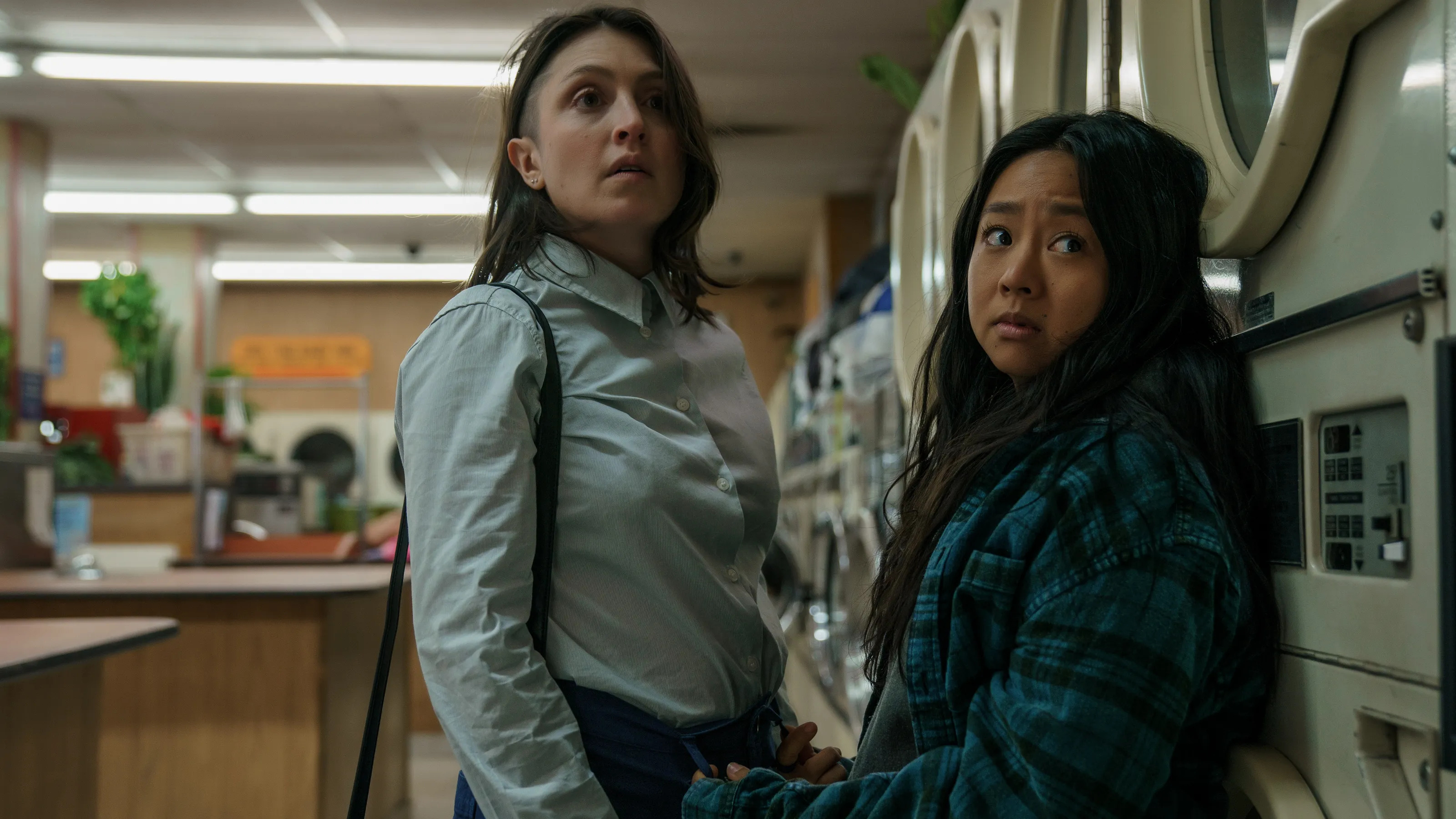
Stephanie Hsu as Joy and Tallie Medel as Joy’s girlfriend, Becky (image courtesy of A24)
The quality of the directors’ writing can be felt immediately. Withheld in just the first few minutes is an enormous amount of insight into intersecting social dynamics. The blocking and cinematography of these effortless establishing scenes is polished, allowing immersion into each of the Wang family’s subjective experiences.
The leading cast speak colloquially, using a mix of Chinese and English with quirky and specific rapport. Michelle Yeoh is flawless as Evelyn, whose brisk and impatient nature is the centre of her family’s dysfunction and also a lot of the comedy, especially when paired with her goofy, carefree husband, Waymond. Waymond is played by Ke Huy Quan, whose return to film after 20 years could not have gone better. His name may not sound familiar but if you’ve ever watched The Goonies or Indiana Jones and The Temple of Doom, then you would have seen him as Data or Short Round.

Ke Huy Quan as Data in The Goonies, 1985. Image: Supplied
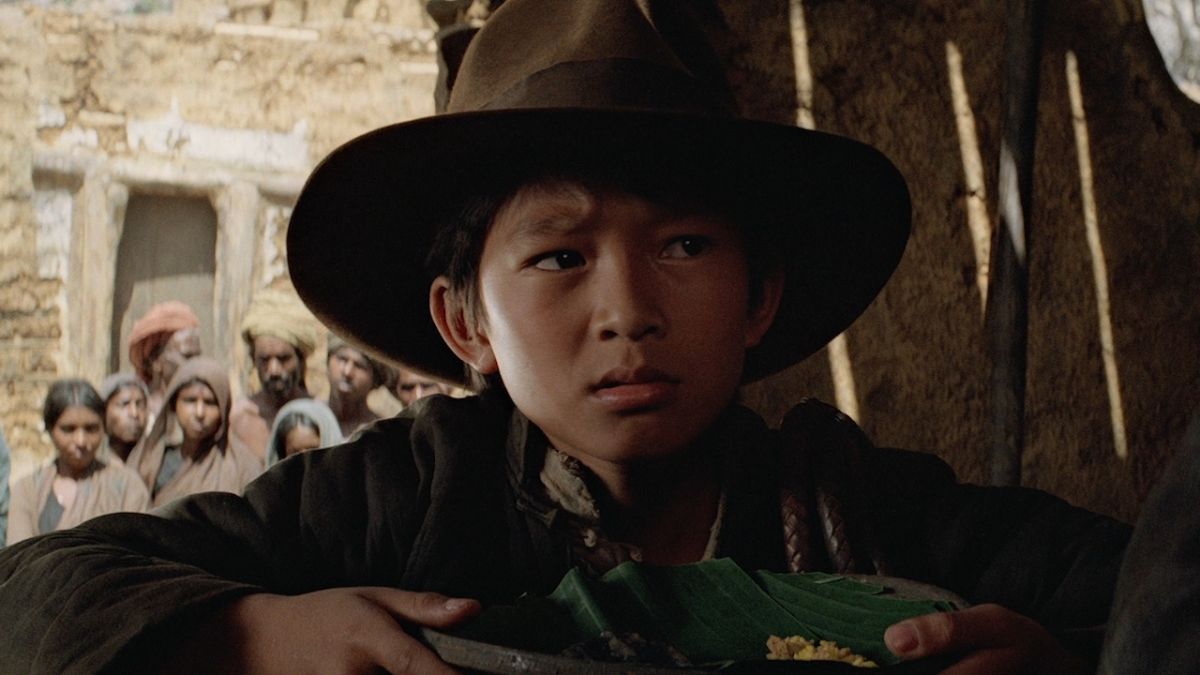
Ke Huy Quan as Short Round in Indiana Jones And The Temple Of Doom, 1984. Image: Supplied
It’s Waymond who kicks off the playful insanity that comprises about 120 of the film’s 140 minutes. While Evelyn argues with Joy, a closer look at the security cameras reveals Waymond doing parkour through the Laundromat. No explanation. This is to be expected from directors Daniel Kwan and Daniel Scheinert, affectionately known as “Daniels”, who also directed the unpredictable insanity of Swiss Army Man.
Audiences are often given more information than the protagonist in a film to provide context, but in Everything we are just as clueless as Evelyn most of the time and a viewer going in blind would likely be utterly perplexed. If you watched the trailer first, you’d know that the multiverse has been plagued by some force of chaos and a version of Waymond has identified the Evelyn from our universe as the one with the potential to bring balance to everything.
This still doesn’t prepare you for the surreal logistics of this world. Its nonsensicality is comparable to that of Douglas Adams’s famous infinite improbability drive or the concept of interdimensional cable in Rick and Morty. Objections like “that doesn’t make any sense!” are met with explanations like “exactly – the less sense it makes the better!”.
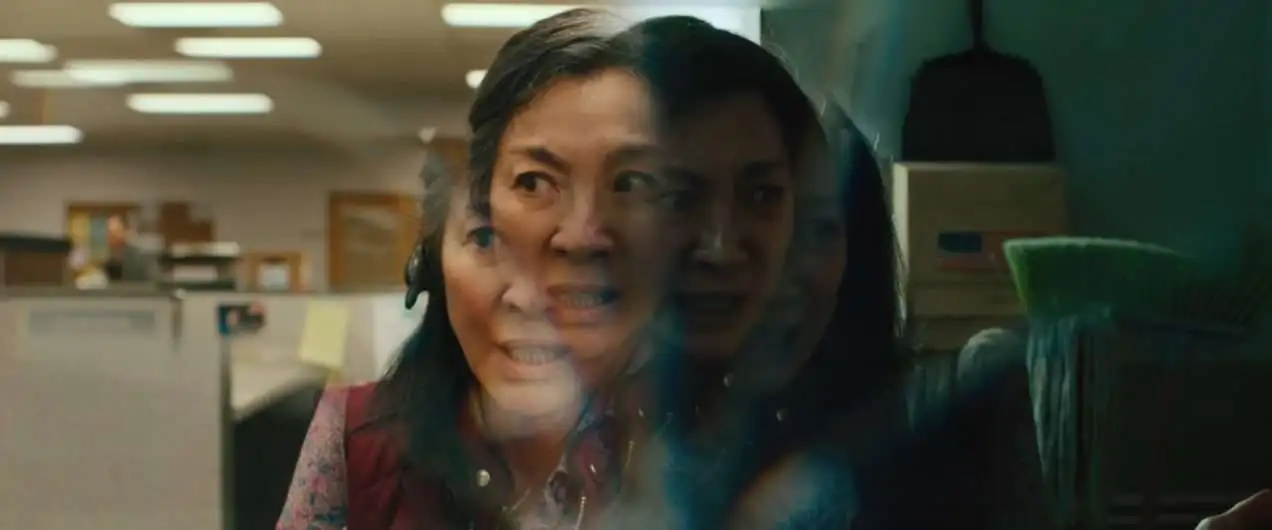
Michelle Yeoh as Evelyn Wang (image courtesy of A24)
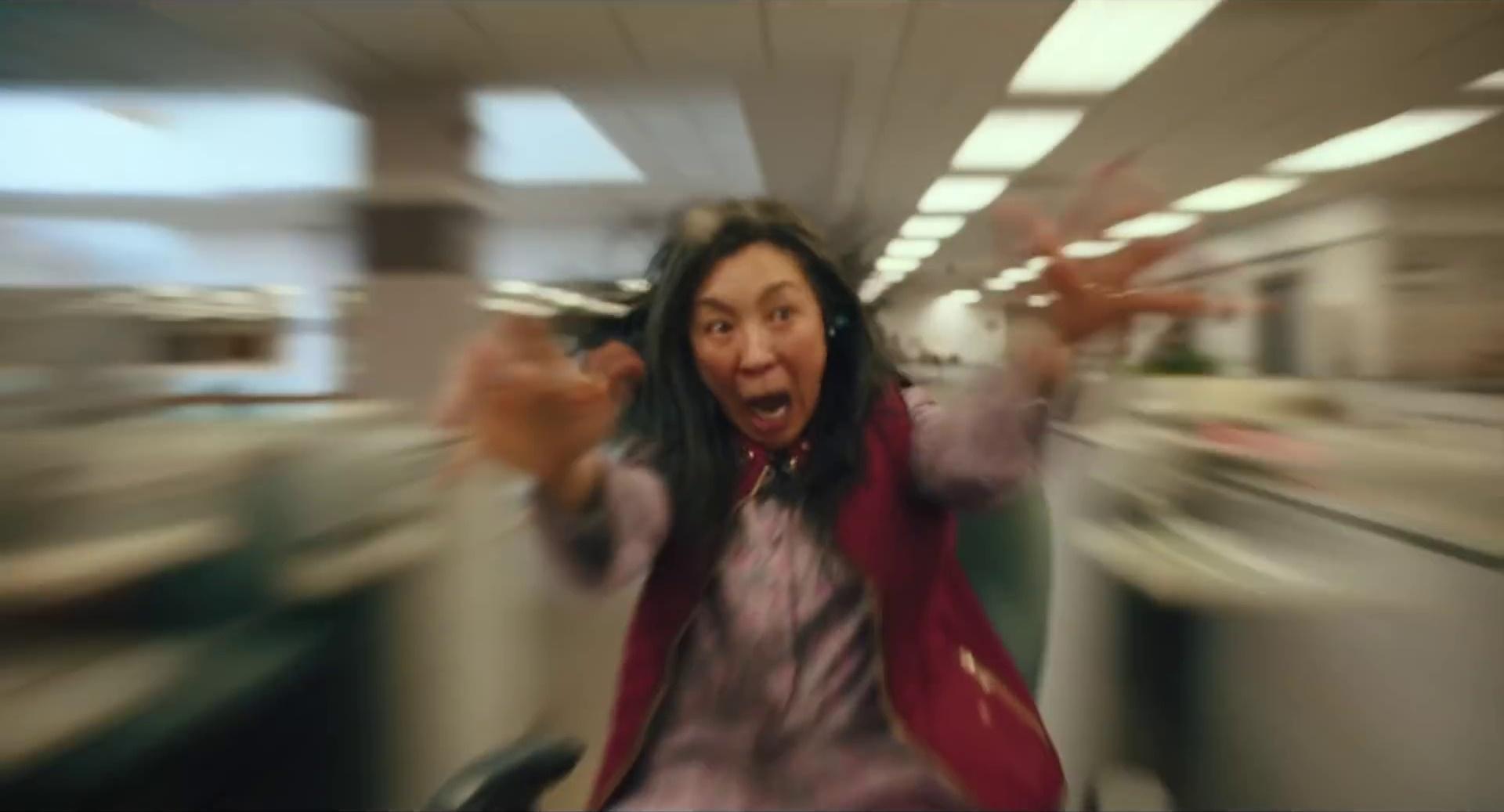
Michelle Yeoh as Evelyn Wang (image courtesy of A24)
Because this absurdism necessitates random ludicrous scenarios, it could fairly be deemed a bit of a cheap trick to justify childish humour, but the charm of unrepentant madness is irresistible. Eventually you adjust, making it possible for outlandishly stupid situations to be simultaneously profound or hardcore.
It’s no exaggeration that the most sapient scene in the entire film involves a conversation between two rocks. The flamboyant, nihilistic, all-powerful antagonist calls themself Jobu Tupaki, a comically unthreatening name which apparently means “pocket gun” in Tamil. Why? Because why not. The fantastically innovative combat choreography has deadly battles fought using a fanny pack, a Pomeranian on a leash, and quite a lot of sex toys.

Fanny pack fight. Ke Huy Quan as Waymond (image courtesy of A24)
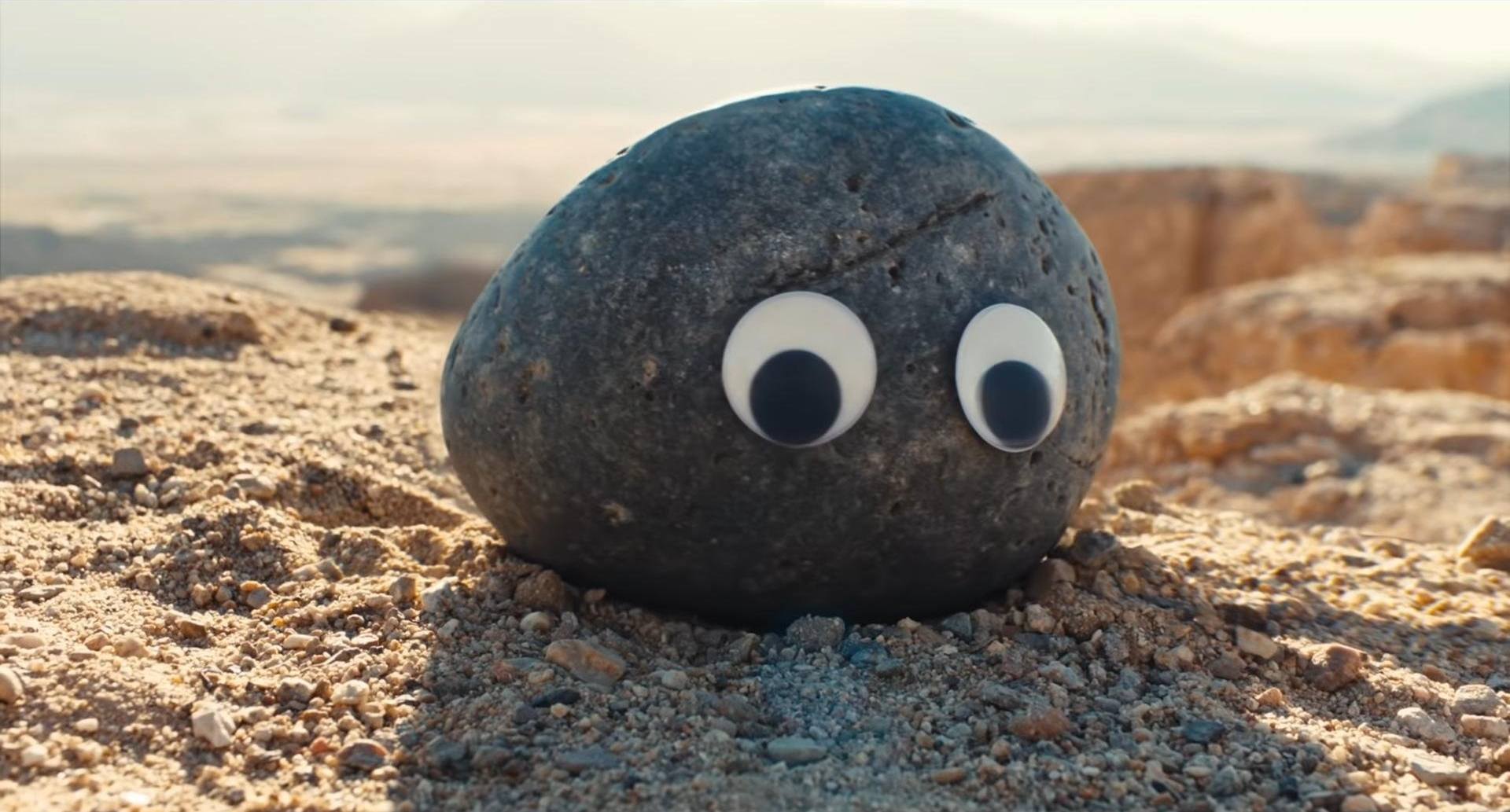
Googly eyes rock. Production still from Everything Everywhere All At Once (image courtesy of A24)
Yeoh and Quans’ background in kung fu enable them to do these wacky fights without relying on cuts and stunt-doubles, so their comedic acting shines through during the most intense conflict. The stunt coordinators were the same talented team that worked on Shang-Chi and the Legend of the Ten Rings.
Based on concept alone, Shang-Chi and Everything should be somewhat similar films. Both are action-packed, save-the-world sci-fi dealing with family trauma and the Americanisation of a generation of English-speaking children of Chinese families. Yet Shang-Chi was a pretty standard Marvel movie and Everything is in a completely different league, because those themes are its core rather than a marketing pitch.
Evelyn has vices, and not just the ones Hollywood condones as harmless, like arrogance or vulgarity, both of which are intended to be completely forgivable of the white male superheroes we’re used to like Iron Man, Wolverine or Doctor Strange.
Evelyn is prejudiced. She has some level of homophobia and shames her daughter for her weight. She’s a cog in the machine of intergenerational trauma, putting unreasonable pressure on her daughter, just as her father did to her. This fallibility makes her complex and real rather than archetypal and leaves room for her to grow as a character.
Chinese American tropes are poised sensitively so they may be taken seriously and mocked interchangeably. A customer remarks, “I thought you people were good with money” and we sympathise with Evelyn, until a Jewish customer comes in and Evelyn refers to her as “Big Nose”.
The clashing of the Wang family has a neurotic humour to it reminiscent of Jewish New York sitcoms. A lot of fun is also drawn out of Evelyn’s budding bilingualism without being patronising, like when she throws a pair of plastic googly eyes on the floor and shouts “No more Google eyes!”, or when she exasperatedly attempts to explain the movie Ratatouille but thinks it’s about a raccoon and is called Raccacoony.
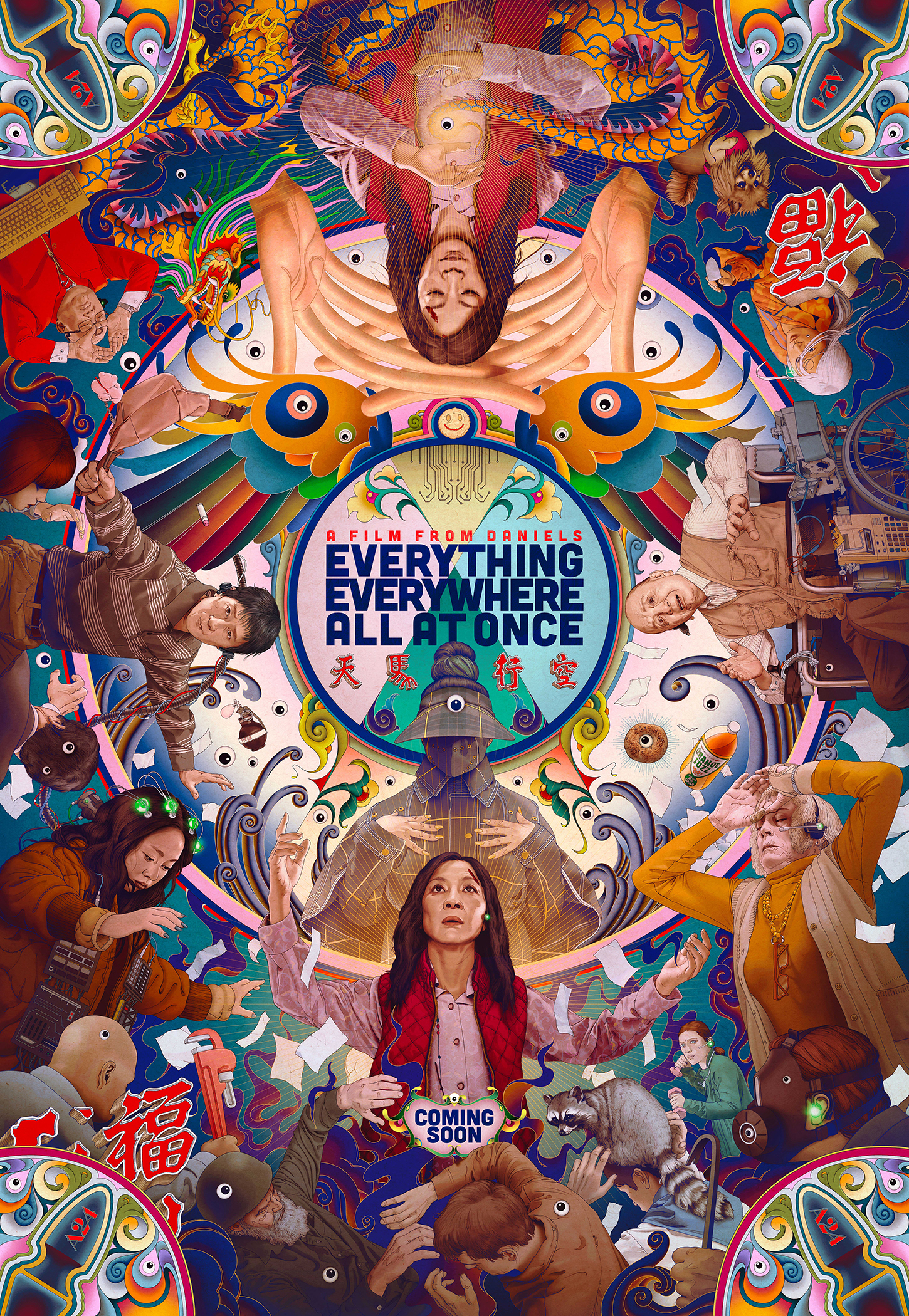
Everything Everywhere All At Once official poster (image courtesy of A24)
The abundance of humour combined with the epiphany of the multiverse – that nothing matters because everything always exists – culminates in the most joyous, life-affirming kung fu finale you have ever seen, and a unique ideological standpoint one might call nihilistic optimism. There are infinite alternative universes where things could have turned out differently, but you live in this one. There’s no point getting stuck on what could have been, no reason not to appreciate the good things in your life; everything’s bullshit anyway, so why not just be kind?
At one point, Waymond tries to impress upon Evelyn the insignificance of her daily worries, saying, “I’m sure you have a lot on your mind but I cannot imagine anything mattering more than the conversation we are having right now concerning the fate of every single world in an infinite multiverse”. The directors don’t seem to agree though. It says a lot about their perspective that the universe in which Evelyn is trying to salvage her relationship with her husband and daughter ends up being more important to wrapping up the film than the one in which she’s trying to save the multiverse.
The writing in Everything is a feat of double meaning comparable to that of Cloud Atlas, an amalgam free from narrative continuity, metaphorically layered so as to be poetic in several dimensions of its complex web of stories simultaneously. A film so successfully multifaceted is deserving of the ambiguous, boastful, brilliant title: Everything Everywhere All At Once. DM/ML
Everything Everywhere All At Once is available in South Africa in cinemas. You can contact This Weekend We’re Watching via [email protected]
This story was first published on 20 May 2022.















 Become an Insider
Become an Insider
I haven’t seen the movie yet – looking forward to it – but I’m wondering whether this critique may be better than the movie itself. “Free from narrative continuity” sounds a lot like “a hotchpotch of ideas that don’t fit together”. Etcetera. But I enjoy your writing, TTS, thank you!
Jamie-Lee Curtis and her sausage fingers are definitely a highlight.